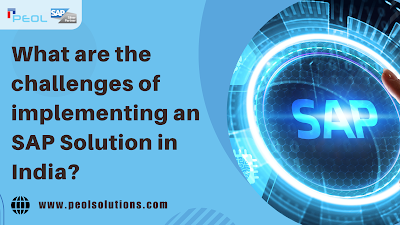What are the challenges of implementing an SAP Solution in India?
Introduction:
Implementing SAP solutions in India is a transformative journey for businesses seeking operational excellence and digital empowerment. However, there are several challenges that businesses face in India's diverse and complex business landscape. Let's discuss some of these challenges.
Diverse Regulatory Landscape:
India has a federal structure with diverse regulatory frameworks across states. Compliance requirements, intricate tax laws, and regulatory nuances require accurate planning and localized expertise. Harmonizing SAP systems with ever evolving legal mandates remains an endless challenge, necessitating agile adaptation and proactive compliance strategies.
Cultural and Linguistic Diversity:
India's diverse cultural mosaic manifests in a multitude of languages, customs, and business etiquette. Effective SAP implementation requires transcending linguistic barriers and accommodating regional property. Customization of SAP interfaces, training modules, and support mechanisms to resonate with diverse cultural sensibilities emerges as a critical imperative, fostering user adoption and organizational alignment.
Infrastructure Constraints:
India has made significant progress in digital infrastructure. However, there are still major disparities in infrastructure and connectivity across the country. This poses several challenges to deploying SAP and accessing data, particularly in remote areas and tier-II cities. Unreliable internet connectivity, power supply disruptions, and bandwidth limitations are some of the obstacles that need to be addressed. To ensure uninterrupted SAP operations and data accessibility across different regions, there is a need for modern infrastructure development and strategic partnerships with telecom providers.
Talent Crunch and Skill Gap:
The shortage of skilled SAP professionals worsens implementation difficulties, which leads to recruitment issues and competency gaps. Organizations face the daunting task of finding proficient SAP consultants and developers who are well-versed in specialized modules. To cultivate a skilled SAP workforce ecosystem, investing in comprehensive training programs, creating internal talent pipelines, and forming strategic partnerships with academic institutions are vital strategic imperatives.
Legacy System Integration:
India's business sector faces significant challenges in integrating legacy systems, which have become entrenched in its fabric. This has led to the creation of data silos and interoperability issues. To seamlessly align different legacy platforms with SAP architectures, meticulous data mapping, legacy system rationalization, and interoperability protocols are necessary. Robust middleware solutions and API frameworks are crucial in enabling cohesive integration, ensuring data integrity, and improving operational agility.
Cost and Budgetary Constraints:
Implementing SAP requires significant upfront investment, including costs for software licensing, infrastructure upgrades, and consulting fees. Indian enterprises often face challenges in navigating the financial complexities of SAP implementation due to cost-conscious mindsets and strict budgetary allocations. However, organizations can prioritize cost optimization strategies, leverage cloud-based deployment models, and adopt phased rollout approaches to mitigate financial risks and optimize their ROI trajectories.
Change Management and Organizational Resistance:
Implementing SAP is a significant change in how an organization operates. It can cause concerns and resistance from people who are used to doing things the old way. To make this change successful, the organization needs to take active steps to manage the change. This includes getting people to buy into the new system, encouraging everyone to keep learning and adapting, and creating a culture where innovation and flexibility are valued. To achieve this, clear communication, user-friendly training, and opportunities for people to give feedback are essential. When the organization can transform itself in this way, it will be better positioned to thrive in the future.
Data Security and Privacy Concerns:
In today's world, cyber threats and data privacy regulations are on the rise. It has become crucial to protect sensitive data by implementing strong encryption, access controls, and compliance measures. Partnering with certified data security vendors and establishing robust data governance frameworks can help safeguard against data breaches and compliance lapses. This not only enhances the organization's resilience but also instills confidence among stakeholders and customers.
Conclusion:
Indian enterprises can overcome their challenges by embracing agility, innovation, and resilience. Proactive collaboration, strategic foresight, and unwavering commitment can serve as catalysts for success. By unlocking the transformative potential of SAP solutions in India, organizations can drive business growth and promote digital excellence in India's dynamic economic landscape. As organizations start this journey of transformation, the challenges they encounter can become opportunities for innovation, leading them toward a future defined by technological prowess and operational brilliance.
For More Details:
Call: +91 8217898630
Mail: sales@peolsolutions.com
Visit: https://www.peolsolutions.com




Comments
Post a Comment